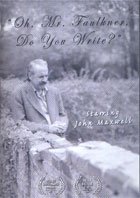
Oh Mr. Faulkner, Do You Write? 2008
Distributed by Microcinema International/Microcinema DVD, 2169 Folsom Street, Suite M101, San Francisco, CA 94110; 415-447-9750
Produced by Jimbo Barnett
Directed by Jimbo Barnett
DVD, color, 1 hr. 22 min.
Sr. High – General Adult
African American Studies, American Studies, Biography, Communication, Drama, History, Literature, Storytelling, Theater, Writing
Date Entered: 12/21/2011
Reviewed by Steve Bertolino, Reference and Instruction Librarian, Middlebury College, Middlebury, VTMuch as I tend to dislike one-sentence reviews, Oh Mr. Faulkner, Do You Write? might well be able to be summed up in this way, though I’ll need a few commas to do so. If you are coming to this performance to be entertained by a consummate performer presenting the often funny ramblings of an alcoholic Southern writer and grumpy old man, you’ll have an enjoyable time and get some witty, punchy and sometimes even weighty one-liners to use with your friends, but if you’re coming to learn about why Faulkner wrote what he wrote and an insightful investigation into American literature and Faulkner’s place within it, what he accomplished and why we should care, you’ll be deeply disappointed.
To some degree, the latter expectations are not entirely well-placed. As with Hal Holbrook’s masterful one-man shows as Mark Twain, it is primarily the personality of William Faulkner which is the point of John Maxwell’s show. And, like Twain, the curmudgeonly aspects of Faulkner’s personality often belie deep convictions about important issues like race relations, foreign relations, the importance of art, and what home and family mean. Unfortunately, Faulkner’s novels are more interesting than he himself was; there’s a reason why we still think of both as first-rate writers, but see Twain as a public intellectual and Faulkner as an argumentative loner.
The decision whether or not to accept the Nobel Prize for Literature in 1950 is the general conceit of the show, as Maxwell depicts Faulkner as a fussy hermit, worried that his neighbors will lose respect for him if he accepts money and an award from a foreign country. Maxwell does understand the inherent contradictions in Faulkner’s character; at one point he has Faulkner admit his first critical and commercial hit, “Sanctuary,” was intended to be sensationalistic and make money. But most of the personality Maxwell presents here is simply too smooth, too calculated, too concerned with making his audience laugh to really provide consistent insights into his character. In the second half of the show, there’s a long section on the Nobel and Russian literature in which Maxwell’s Faulkner seems on the verge of sharing truths close to his heart. This is followed with long stories about his family growing up which are almost nothing but stand-up comedy, followed with more serious thoughts on race and the South, and touching tributes to the people in his life – his mammy, his daughter, his brother – who have died. The tone is all over the place, and intentionally so, but it’s not always to best effect.
Like many of Faulkner’s characters, I cannot but help ending where I began. As a brief, well-performed look at the personality of a major American and Southern writer, the film is strong, but as a real investigation of Faulkner’s art and work, it’s quite weak. Those teachers and classes interested in the Southern character or in theater studies for monologues and character development will get the most out of it, with literature students and aspiring writers getting the least.
Awards
- Best Actor, Atlanta Film Festival, 2006
- Audience Choice Award, Crossroads Film Festival, 2007